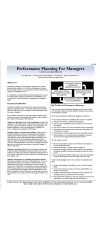Employee Engagement And Business Success?
Over the last years, various research companies have published research reports and white papers “proving” there is a relationship between higher levels of employee engagement and various business indicators, like revenue, profits, and even stock prices.
Many of these studies are published by reputable firms, like Gallup (who by the way makes money by helping companies measure engagement). There are two problems here:
When you have a company or companies doing research on something AND profiting by marketing tools related to that something, you have a conflict of interest. That’s not to say that Gallup intentionally fudges the research at all. It does mean that there will always be a possibility of bias. It’s in Gallup’s interest to find important relationships between employee engagement and productivity, and/or to report it in a way that may be factually accurate, but interpreted with a particular slant, even an unconscious one.
The second problem lies not with the research firms, but with ourselves. Very few of us actually read the original research studies on anything these days, in full. And, we don’t look at the methodologies used, or we lack the research experience to identify the logical flaws in the research, and how it’s reported. We WANT to find simple solutions to explain things to us, so even when more information is provided by the research companies, most of us don’t read it, or think about it. To make it worse, most of us get our information from third hand sources — media, pundits, consultants and so on, who often also haven’t read the research.
The result is it’s easy to come away with the idea that:
If we increase our employee engagement levels, we will be more profitable, or successful. That zeitgeist is all around us.
The problem is there’s no real evidence to support that.
What Does The Research REALLY SAY On EE And Business Outcomes
The research published by Gallup and other firms finds that companies with highly engaged staff tend to be more effective when you look at business indicators, stock prices, revenue, staff retention, etc.
That does NOT mean that higher engagement CAUSES better business indicators. All it means is that to some degree, they occur together.
It’s the old correlation is not causation problem. It is possible that higher engagement levels cause better business outcomes. If that’s the case, then if your company can increase engagement ENOUGH (we don’t know how much is required to affect business outcomes), the company should see bottom line results.
The Second Interpretation: Something Else Causes Both Business Success AND Engagement
The second way to interpret the data is just as valid. Neither EE or business outcomes CAUSE each other. There might be a THIRD factor, or a multitude of factors that cause both of them. Let’s look at an example.
Let’s say you run a business on the beach — a seafood restaurant. You measure EE every quarter as a benchmark, and the company makes an effort to engage its staff.
Between June and August, you find two things:
- Employee engagement scores increased.
- Revenue and profit margin increased.
So, you could interpret that as a “successful” endeavor to improve business results, and continue to put more money into it.
But here’s the thing. During that period, your geographic location experienced very warm weather that drove people to the beach where you are located in droves. At the same time that warm weather also affected your employees, so in fact they enjoyed working more on the beach, being close to the ocean and so on. After all, it makes sense that your employees might feel more positively towards their jobs, and even towards their employer because it’s a lot more fun to work on the beach when the weather is good, than if you have a string of hurricanes, dreary rainy weather, or…well, snow (I’m Canadian).
In fact, BOTH EE scores and business indicators were caused by the weather. You don’t know that, because it didn’t occur to you that the two things of interest, business success and EE actually have NO direct relationship at all.
This is a simple example, but there are many things that can go on in a company that WILL affect both EE scores, and business metrics. Layoffs for example will depress EE scores, and can also lower revenues. Or a change in product lines. Or countless other things






